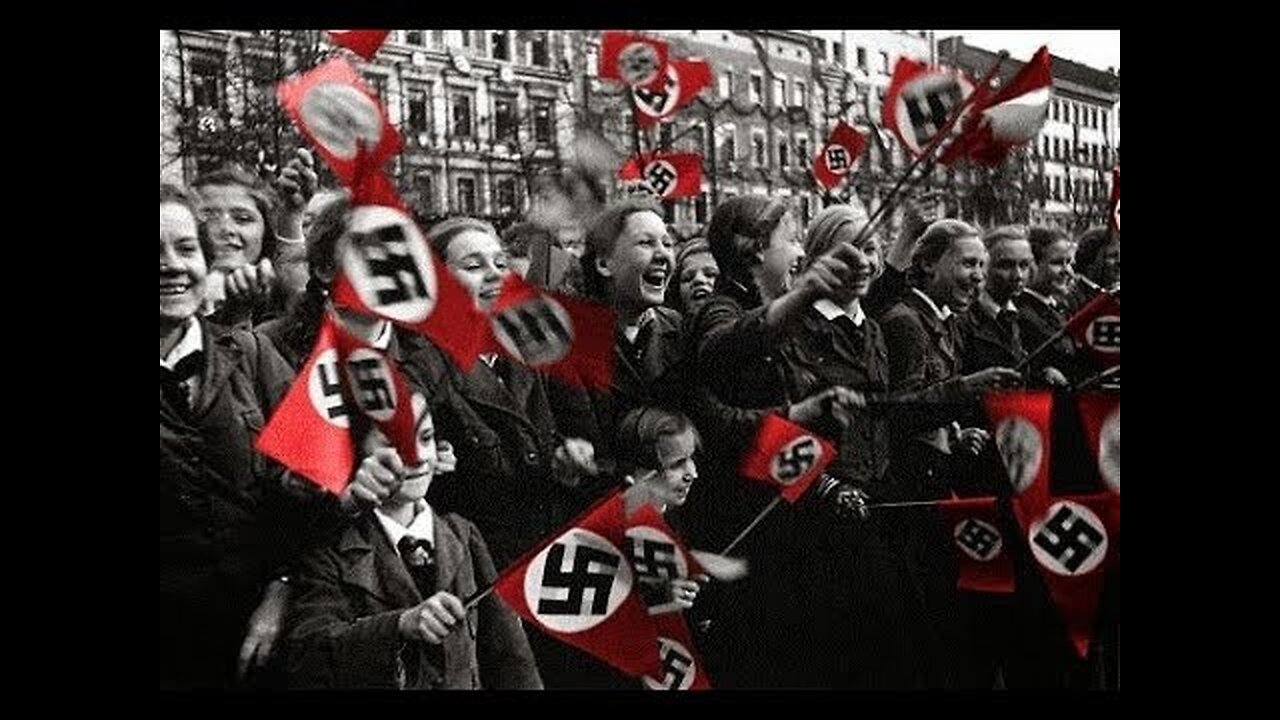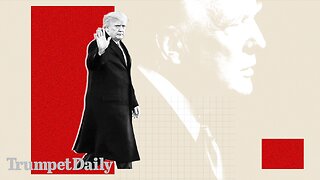Premium Only Content

The Girls and Women of National Socialist Germany
Woman in the National Socialist State
Dr. Sofia Rabe, 1932
NS_Swastika
All other parties have repeatedly reproached female National Socialists [Nationalsozialistinnen] for failing to take a clear stance on the role which they would have to fulfill within the NSDAP: that they would simply become slaves to an ideology which is rooted in blind faith in a leader. These issues have been raised again and yet again, along with the assertion that the influx of women into National Socialism is based solely upon complete ignorance of the fate which would befall them within the Third Reich.
These allegations are expansive in number, though not in relevance nor in factual knowledge. Our opponents have written entire books about the position of women in National Socialism, all of which culminate in a single sentence: National Socialism wishes to degrade women into breeding machines, so that women in National Socialism will only have a biological function to fulfill.
At the same time, Adolf Hitler and [Alfred] Rosenberg have been quoted – in sentences taken completely out of context – and those quotations twisted and turned as needed and desired.
We women National Socialists have only one response to this: For us there is no Frauenfrage1 along such lines, we know of only one goal: to serve our Volk and to aid in the great struggle for the liberation of Germany, and in so doing to integrate ourselves into the whole of the Volk as its welfare demands.
On one side we see that old (not in years) generation who like to regard everything today as being good and right; whose ideal exhausts itself in working for its own sake; who allow themselves in their inadequacy to be set upon the wrong path.
Opposite them we see the young generation who stand today within the ranks of the NSDAP. For them the misery of women is a part of that great misery of the German Volk, and can only be solved in conjunction with it.
If one looks back at the women’s movement of the last few decades, they will recognize that it has torn women away from the Volk as a whole and has forced them into a special position. It got itself lost amid the details, and had no understanding for the Volk as a collective. Anything that resembled politics took place within a framework of pacifism.
It felt itself to be one with “women of all countries,” and fought against its own folk-comrades!
It fulminated against ignoble “enslavement by man,” yet never found the right path to the true emancipation of women.
It was forgotten that there is not merely one type of ‘person’, but rather men and women who are apportioned special responsibilities, and it was not recognized that every smaller part is bound to the greater whole. Each cannot disengage itself and go its own arbitrary way. The self-seeking, liberalistic person is an individualist. His primary concern is himself. The women’s movement has also endorsed this outlook.
Woman, however, is not outside the Volksgemeinschaft. She is the first to suffer when her family breaks apart. We women National Socialists therefore understand woman’s politics as being something entirely different – namely as being everything associated with exploring the circumstances of German folkdom, and beyond that the achievement of our goal of finding our Volk’s path to freedom.
We must engage with our social and cultural issues in accordance with our nature, and we have recognized that only National Socialism can rescue us from what a couple of misguided women’s rights activists have tried to impose upon us against our will.
We do not indict fate for imposing so much responsibility on us with regards to our Volk. No, we are proud of the fact that we have been placed in this particular time. We are proud to be able to contribute to the great work of Adolf Hitler.
We gratefully acknowledge that only National Socialism can save us and can seek to make us again what we should be by nature, namely the women and mothers of our Volk.
Many have not yet recognized, or do not yet want to recognize, what a large field of work awaits clarification here. The task which we have to fulfill within the National Socialist movement will also be a very great one, in this respect.
Our struggle
is not a struggle in the spirit of the old women’s rights movement,
but a struggle for the right
and the freedom to be able to serve.
and to help.
In that sense, woman will always be happy to become the
Handmaiden to her Volk.
Adolf Hitler said: “There is no struggle for a man that is not at the same time a struggle for the woman, and there is no struggle for a woman that is not at the same time a struggle for the man. We recognize neither men’s rights nor women’s rights, we recognize only one right for both sexes, which is at the same time the duty to live, to work, and to struggle together for the nation.”
In cultural and economic relationships among the Volk as a whole, the woman as housewife and mother must always come first. National Socialism seeks the only possible salvation for the German Volk in a race-preserving state, and it is women’s responsibility to maintain the purity and the healthiness of the German Volk. However, this will require the legal protection of women.
The prohibition of marriage for folk-comrades who suffer from a communicable or hereditary disease must therefore be demanded within future marriage legislation, so long as a definitive cure has not been discovered. For outsiders these issues are primarily of a cultural significance. Yet they also have an economic significance, because they endanger and undermine the strength of women in their roles as housewives and mothers.
“The preservation of our race lies in the hands and in the nature of women. Any Volk can still rouse itself out of political bondage, but never again from racial contamination… The emancipation of women from women’s emancipation is the first demand of a generation of females who wish to rescue Volk and race – that eternal-unconsciousness, the foundation of all culture – from decline. Woman belongs deeply to the total life of her Volk; all educational opportunities must stand open to her. Under today’s social conditions she must not face any obstacles in her professional life, either (hence maternity protection laws should be implemented even more stringently). Doubtless, however, the efforts of all those who would renew our Volk will – after breaking the anti-populist, democratic-Marxist system of exploitation – help clear the way for a social order which no longer forces young women to flock in droves to a lifelong labor market which consumes the most important feminine energies. Nevertheless, while all educational opportunities for the development of a woman’s energies should be open to her, one thing must remain clear:
“Men must be, and must remain, judges, soldiers, and rulers of state.”
(Rosenberg, Myth of the 20th Century)
If woman’s life’s work and ambition lies predominantly in the field of culture, then the economy has the purpose of securing for her – as it does with men – a means of living and of guaranteeing a livelihood for her and her family, whether she has to meet her needs within the economy on her own, or whether there is a man close to her in life who can help relieve her of this concern. If the chief occupation for a woman is housewife, as per her natural inclinations, then good knowledge of housekeeping is today more necessary than ever. Housewife work is beginning to become very popular once again. Prudence and frugality are administered far more effectively by housewives than by strangers, no matter how good an assistant they might be.
In this respect, the role of the housewife deserves the fullest recognition as a profession. To see this, one need only take a look at the figures associated with her work – not to mention take into account the economic importance of the housewife as a consumer, through whose hands 80 per cent of the entire German national income passes. There are approximately 15 million households in Germany. If one assumes that, in each of these 15 million households, there are on average only 3 people to be provided for, then each of these 45 million people saves about 1 RM per day, money which would have to be spent if they chose to avail themselves of outside services. In this way, through the work of the wife and mother to maintain the family, the German national income saves 45 million RM a day, or around 17 billion RM per year. To all of this must be added the maintenance of clothing and linen, tailoring, cleaning, and nursing. If we now assume that 33 million people are provided for among the households, and that around 50 pfennigs are saved daily per person through the timely repairing of garments and hosiery, then a further 22 million RM will be retained each day, 9 billion in a year. That makes at least 27 billion RM annually which, without the silent work of the housewife, would have to be expended upon outside services. These would be the material wages which the housewife earns for her family through her work. The housewife’s economic importance does not engender a demand from us for an amendment to marriage legislation; instead it elicits a demand for an amendment to marital property rights, in the sense of ensuring economic security for women. The liberation of women, which has been demanded by the women’s movement hitherto, should not be an economic demand in the materialistic sense, but rather a demand for the recognition of the inherent value [des Persönlichkeitswertes] of women as the helpmates and comrades of men.
But is it recognition of inherent value if so-called joint administration is accepted via the BGB as the statutory system of matrimonial property relations?2 This means: that the man possesses administration and usufruct over the woman’s property. All the fruits of her contributed estate become the free property of the man.
It does not count as recognition
of inherent value if today
the statutory property regime fixes joint administration in such a way that the man alone
can determine the use and application of the woman’s property, or if the woman first has to
obtain the man’s permission when disposing of her own assets.
In light of this, we must demand of statutory matrimonial property relations that they permit women a certain independence in relation to men, that the woman and her assets must be safeguarded against any capriciousness from the latter.
If the career of housewife is to be recognized as a profession and as a means of support, then living opportunities for women must also be assured.
A divorced man’s remarriage can lead to gross injustices against a blameless divorced woman from the previous marriage. The BGB offers no protection for innocent divorced women and their children if the husband and father remarries. They are at the mercy of his grace and good will alone, and they are all too often deprived of the attainment of their essential legal entitlements. In these circumstances the man’s remarriage may only be permitted if he has come to an agreement regarding property relations with his wife and children from the first marriage beforehand, and if he has provided guarantees for the fulfillment of the responsibilities he once assumed.
Just as the man can safeguard himself against the woman’s wastefulness by divesting her of the power of the keys,3 by the same token the housewife, as guardian of the family, must be assured security for her and for her children. The man gambling away his payday earnings, or drinking them away, and thereby forcing the woman out of her role of housewife and into the labour market in order to support her and her family, must not be allowed to occur. Man complains today that woman is pushing him out of his gainful employment, without considering that it is he who is driving woman away from her own career. We demand the emancipation of women from the workforce, not the emancipation of women from men.
“The economic security of women and mothers will find a new, better expression in a future marriage law of a German type, one which will assign women a position within the framework of the national community in which they can act in accordance with their life’s purpose, can create values, and can win back the status and prestige which they have partially lost.”
Gregor Strasser.4
It will effectively still be the destiny of a great number of women to have to earn a living through their own initiative.
In 1925, Germany had a total population of 62.4 million, of which 30.1 million were male and 32.2 million female. This consequently meant that there was an excess of 2.1 million women – of which 1.7 million were part of the 21 to 62 age range, for whom there will never be an opportunity to work as housewives. There is also likely to be an excess of women again in future.
If there are 11.5 million women in the workforce today, as compared with 8.5 million in 1907, this increase would appear to the uncritical observer to be conditioned by the surplus of women. In fact, before the war, 8 million women were forced to seek a livelihood for themselves, whereas today women work to secure their own livelihood even without any direct compulsion, displacing men via wage pressure as family breadwinners – and as a result women are again compelled into occupational activities lying outside of their own households. It is precisely because National Socialism seeks to lead women back to their true profession that it will eliminate this wage pressure and will provide men with the opportunity to start families again.
The interests of national public health demand that positions which guarantee a stable livelihood for the maintenance of a family through a fixed income and through permanent employment, and which are presently occupied by workers whose existence is otherwise secured, instead be vacated for male workers in particular.
There will also be women among these workers. Hence it cannot be a question of removing women from economic life altogether, but only insofar as their existence is otherwise secure.
Having said that, we must acknowledge that the diffusion of women into professions alien to their nature has become increasingly common. In this period of the most severe adversity for our Volk, when millions of healthy men are unemployed and cannot afford to feed their families, it is fundamentally important to clarify the issue of the occupational scope of women. The healthy existence of our Volk makes this essential for us.
It should be borne in mind that the influx of female employees into industry and trade has reached such a level that today 13 times as many women are employed in industrial firms, and 6 times as many in business offices, as before the War. This magnitude of female labour, which signifies the enslavement of women, is no longer a culture.
But if women must remain in working life, then they require special legal protection in order to ensure that they are not physically and economically exploited.
Gregor Strasser:
The professional woman in the National Socialist state is equal before the law, and has the same right to the protection of her livelihood by the state as does the married wife and mother. Anyone who works, whether man or woman, whether in their own home or in the workplace, is a full-fledged citizen of the Third Reich.5
This essentially refutes one of our opponents’ most popular accusations: that National Socialism fights against citizenship for women.
It is therefore important, from our point of view, to review the extent to which the relevant labour laws and trade regulations require supplementation and expansion, particularly from the perspective of racial preservation and racial care. Thus, for example, the question as to what extent women should be employed in enterprises run by racial aliens, or in businesses (like tobacco factories) which are detrimental to the health, ought to be examined.
The gainful employment of women means urbanization, urbanization means the degeneration of women – and thus the downfall of the Volk.
Hence:
The Liberation of Women!
The heightened level of female employment as a side-effect of worsening marriage prospects; the impoverishment of wider circles of the population as a result of women’s desire for greater autonomy and for economic independence from men – these are not only disheartening from the point-of-view of women’s health, and thus of public health, but also with regard to the position of women relative to their family, to their household, and to their children.
If woman must be active in professional life in order to maintain the security of her existence, then she should be guided towards genuinely feminine occupations,
where she will find more gratification than in so-called men’s professions.
Needless to say, she can always still work freely. Every opportunity for training should stand open to her.
If anyone believes that the underlying reason behind the scale of female employment today lies in a consciously desired masculinization of women, then this viewpoint is mistaken. I would like to posit against this the notion that the so highly-acclaimed freedom to compete with men is only a pseudo-freedom, one which increasingly leads towards women’s enslavement.
We have a tremendous range of work which requires the appointment of women and only women. In this respect, women’s career prospects are less exhausted than they have ever been. The fields of public welfare work, health care, housing cultivation,6 and education all necessitate the involvement of women. Occupational activity on the part of women is called for here because the common good demands it, and because only women can fulfill it.
Women who join the National Socialist movement thus leave the women’s movement behind as inconsequential, since according to the principle:
Common interest before self-interest,
a special Frauenfrage can no longer exist for them.
This takes place under the proviso that the demands which German men have become accustomed to making upon women, even in an intellectual relationship, are not scaled back.
Needless to say, women must also be educated in state policy. Only then will they be equal to the responsible tasks. Only then can they rear German youth, or identify what is and is not valuable to our Volk in social welfare. Only when we consciously recognize what it means to be German can we fulfill our duties towards our Volk down to the smallest detail.
It also goes without saying that the entire field of child protection, motherhood protection, and the protection of women, along with the legal position of women, can all only be defined through the closest cooperation with women.
For we female National Socialists, the National Socialist movement is not a movement that exists solely to arouse wishful ideals within us, but is instead a movement of action and reality.
Only when our Volk are free once again will women then experience their true liberation. This cannot be accomplished, however, by indulging in pacifist sentimentalities and by fighting “in union with women of all countries” against men, their own folk-comrades – nor by monologuing about one’s position on the disarmament conference(!!) whilst neglecting to raise German youth in a German fashion. “The future belongs to goodness.” With these words from the French Mme. Eidenschenk-Patin,7 the Conference of Mothers and Female Educators culminated on 30.6.1932.
No, the future
belongs to Germany and to our youth,
in order that they can be free!
The National Socialist movement embraces everyone, men and women, and all desire only one thing: the liberation and the salvation of our Volk.
We are all jointly responsible for ensuring that our youth and that we ourselves have the right to live once again.
Woman has the greatest interest in this; for she herself suffers most from the unemployment of her husband, father, and son, and from the pressure of having to earn a living outside of her family.
Adolf Hitler is not only calling men – he is also calling upon German women. We too will do our duty! We also acknowledge only one purpose in our lives:
To be German and to fulfill one’s duty
means not to be self-sufficient,
but to serve the community –
that is duty.8
NS_Swastika
-
 47:17
47:17
Kimberly Guilfoyle
14 hours agoWoke Gets DOGE’d, Live with AJ Rice & Jarrett Stepman | Ep. 197
133K43 -
 20:11
20:11
Candace Show Podcast
12 hours agoBecoming Brigitte: Candace Owens x Xavier Poussard | Ep 6
200K332 -
 8:25:38
8:25:38
Dr Disrespect
17 hours ago🔴LIVE - DR DISRESPECT - ELDEN RING DLC - REVENGE
197K22 -
 54:22
54:22
LFA TV
1 day agoThe End of the Trans-Atlantic Alliance | TRUMPET DAILY 2.17.25 7PM
52.5K7 -
 55:56
55:56
BIG NEM
15 hours agoUGLY COCO: The Rapper Who’s Tried EVERY PSYCHEDELIC 🌌
24.4K1 -
 1:42:51
1:42:51
2 MIKES LIVE
13 hours ago2 MIKES LIVE #181 Deep Dive Monday!
28.2K3 -
 1:57:43
1:57:43
Quite Frankly
14 hours ago"Low Tide at The Pier: Munich Tears" 2/17/25
39.9K19 -
 27:44
27:44
The Based Mother
14 hours ago $0.81 earnedBOOK BAN LIES. Karen England and the MSM fairy tale that books are being “banned” by fascists
19.5K3 -
 1:01:52
1:01:52
In The Litter Box w/ Jewels & Catturd
1 day agoBest Presidents' Day Ever! | In the Litter Box w/ Jewels & Catturd – Ep. 743 – 2/17/2025
113K68 -
 1:29:15
1:29:15
Simply Bitcoin
17 hours ago $10.35 earnedThey JUST Triggered A Global Gold Rush: $1M Bitcoin is coming! | EP 1184
97.5K34